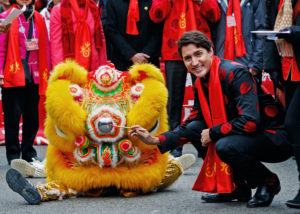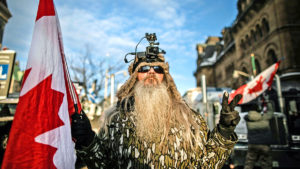Will there be a Commonwealth left for King Charles III to rule over? In the week since his mother’s death, officials in Jamaica and Antigua and Barbuda have publicly questioned whether their countries should join the ranks of Barbados, which became a republic last year. In the former settler colonies of Australia and New Zealand, Prime Ministers Anthony Albanese and Jacinda Ardern (both professed republicans) have paid their respects to Elizabeth II — yet it appears that emboldened republican movements could gain momentum in their time in office.
There is one Commonwealth realm, however, where republicanism is anathema — at least among the establishment. Canada’s dominant political culture descends in large part from loyalist exiles who fled the American Revolution in the late 18th century, and so it is no surprise to see their contemporary heirs, the present political establishment, expressing support for the monarchy. (It is a different story for the general population who usually lie somewhere between lukewarm and “unaffected”.)
This runs contrary to the widespread image of Canada’s elites as post-modern cosmopolitans who despise their own history and traditions. But the recent outpouring of personal homages paired with pro-monarchy sentiment led by the likes of Liberal prime minister Justin Trudeau and his cabinet, former Governor of the Bank of England Mark Carney, and the editorial board at the national newspaper of record, is indicative of where the Canadian ruling class stands.
Unlike in other parts of the Commonwealth (and discounting the special case of Québécois separatism), there has never been a properly pan-Canadian republican movement of any significance, much less a prime minister who avowed republicanism (the closest was a high-ranking cabinet minister in the 2000s, but his was an isolated case). More than a convenient way to distinguish Canadians from Americans, the monarchy has become an unlikely object of affection for those who govern Canada.
Trudeau himself is, of course, a hereditary monarch who would have never risen to the top were it not for his surname. In fact, Trudeau first met the Queen as a child in 1977 when his father was prime minister. Their personal history became the subject of a humorous exchange in 2015, when the Queen remarked: “Thank you, Mr. Prime Minister … for making me feel so old.”
Historically, the Trudeau Liberals have often been regarded as either indifferent or outright hostile to Canada’s imperial heritage. It was this party, after all, that retired the Union Jack and Red Ensign in favour of the Maple Leaf Flag in 1965, while one of the most iconic images of Trudeau Sr. is of him doing a pirouette behind the Queen, noted as a gesture of irreverence. More recently, a Liberal government dropped the adjective “Royal” in the name of Canada’s navy and air force, only for it to be restored by the succeeding Conservative government.
Yet such stylistic changes belie the fidelity maintained by Canada’s liberal establishment towards the Crown. Trudeau Sr. and the Queen, by all accounts, actually had a warm and fruitful relationship, which is exhibited in two more iconic photos: one in which the prime minister is peeking under the monarch’s umbrella, and another featuring the two presiding over the “patriation” of the constitution, in which Canada severed the last colonial links with London and became a fully sovereign state. For the final act in this constitutional saga, in 1982, the Queen came to Ottawa to personally grant royal assent to what had been the elder Trudeau’s life’s work: the pillars of today’s progressive Canada — the Charter of Rights and Freedoms, official bilingualism, multiculturalism — were codified.
Against charges that Pierre Trudeau discarded the history and values of the Old Canada, the Queen’s presence at this pivotal moment in the country’s evolution highlights not the disjuncture but rather the continuity between the Old Canada and the New. For the nation-building project begun in 1867 with declarations of fealty to Queen Victoria reached its maturation under the gaze of her great-great-granddaughter. The motto of the province of Ontario is thus an apt descriptor for Canada as a whole, no less under its current liberal and multicultural Trudeauvian regime: Ut Incepit Fidelis Sic Permanet. (“Loyal she began, so she remains.”)
So perhaps it is understandable that Canada is not as eager as its Commonwealth cousins to leave the royal embrace. When a newly-elected Justin Trudeau was asked by the BBC if he was sympathetic to republicanism, he replied: “We’re perfectly happy with our Queen of Canada.” No doubt he will be just as happy with the new King of Canada. As Jacobin correctly pointed out in its denunciation of this modern-day liberal monarchism inherited from the nation’s counterrevolutionary forebears: “Canada’s elites and its governing class admire the royals and evidently want their legacies to endure … [they] see in the monarchy a reliable ‘last resort’ to maintain ‘stability’ and prevent potential major upsets resulting from popular will.”
What is notable these days is not so much how Canada’s centre-left elites have lent their support to monarchy, but how the Right-wing opposition to those elites has increasingly drifted into anti-monarchist territory, almost seeming to converge at times with voices on the Left. The opposition Conservative Party is officially devoted to the monarchy; indeed, the mood at the election of their new leader last Saturday, the pro-trucker populist Pierre Poilievre, was subdued in the wake of the Queen’s death. Poilievre opened his speech with a tribute to the late sovereign and expressed allegiance to her successor with the words “God Save the King”. However, the highly online Right-wing base that bolstered Poilievre has begun to see things differently.
Scrolling through the Twitter replies to coverage of the King’s first speech by the conservative site True North Centre reveals how its Right-wing audiences view the new monarch: “An irresponsible globalist”; “Please don’t put his face on our money”; “All hail King Klaus”. As these responses suggest, Charles III’s record of speaking up on climate issues or taking the stage with Klaus Schwab at the World Economic Forum has not endeared him to the Freedom Convoy.
It is also notable that one of the most active media supporters of the convoy had previously come out in support of abolishing the monarchy in the conservative National Post, while revolutionary republican imagery of the 1776 variety was a very prominent feature in those demonstrations. Aside from the Stars and Stripes and the Gadsden flag, the truckers and their sympathisers waved the Patriote flag of the 1837 Lower Canada rebellion against the Crown, and the Eureka flag beloved of Australian republicans (and lately used by anti-lockdown protesters in that country).
Meanwhile, across Canada’s Western provinces, particularly in oil-rich Alberta, a new kind of separatism has reared its head in response to the perceived abuses of the same Central Canadian liberal elites. The intellectual currents fuelling this movement have long-harboured the fantasy of seceding from “the bureaucratic despotism of Ottawa” and carving out a libertarian republic in the prairies. Even with the potential elevation of a premier running on a platform of de facto secessionism, this is admittedly a distant possibility but one that nonetheless highlights the synergy between Right-wing populism and the republican ideal.
As the Trudeaus and the Carneys can attest, the monarchy has stood as a symbol of order, stability and continuity in Canada, as it has in Britain and throughout the Commonwealth. But it remains to be seen if this ancient inheritance can continue to resist the hyper-politicisation of institutions that has become so ubiquitous in this era of culture war and populist ferment.
Disclaimer
Some of the posts we share are controversial and we do not necessarily agree with them in the whole extend. Sometimes we agree with the content or part of it but we do not agree with the narration or language. Nevertheless we find them somehow interesting, valuable and/or informative or we share them, because we strongly believe in freedom of speech, free press and journalism. We strongly encourage you to have a critical approach to all the content, do your own research and analysis to build your own opinion.
We would be glad to have your feedback.
Source: UnHerd Read the original article here: https://unherd.com/



